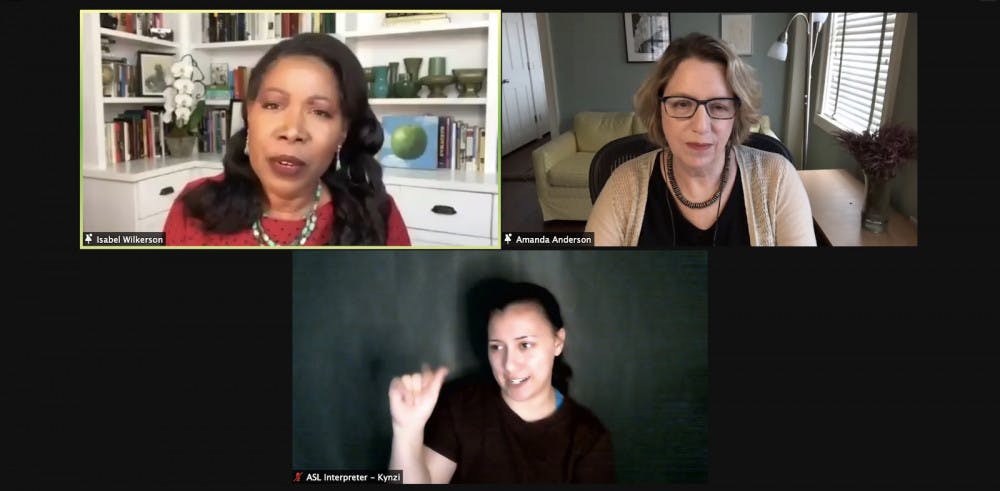Pulitzer Prize winner Isabel Wilkerson likened racial divisions in the U.S. to a caste system during the Lemley Lecture on April 1 about her new book, “Caste: The Origins of Our Discontents.”
“Caste is with us whether we recognize it or not. It’s working within our society, whether we see it or not,” Wilkerson said. “We have seen a continuing manifestation of the centuries-old divisions and hatred that we have inherited.”
Wilkerson said that while the United States’ caste system is less well known than India’s, it still foments social divisions.
“When (Dr. Martin Luther King) went to the southern part of (India,) he wanted to see people who were, at the time, known as ‘untouchables,’” those who were a part of a marginalized caste, Wilkerson said. When he visited a South Indian school, the principal introduced him as “a fellow untouchable.” Although initially unhappy at this title, Wilkerson said, King soon drew similarities between the treatment of the “untouchables” in India and that of African Americans in the United States.
King “thought about how (Black Americans) were being held in a fixed place,” she said, prevented from voting, using public services, and having basic rights as citizens. “He thought about it, and said ‘I am an untouchable, and every Black person in the United States is an untouchable too.”
Wilkerson went on to elaborate on how a caste system persists in the United States today. She defined caste as a “graded ranking of human value in a society,” and said that the hierarchy does not result from any individual’s actions, but from being born into a certain group.
“In our country, the metric that the early colonists used to divide and to rank people … was the metric of race,” she said. “Race was used to determine who could own property and who could be property.” Wilkerson said that this racial hierarchy was manifested in the institutions of slavery and Jim Crow, both of which “cast a shadow” to the present day.
She specifically referenced the continued influence of racial hierarchy on recent events such as the killings of George Floyd, Ahmaud Arbery and Breonna Taylor, and the Capitol insurrection. Wilkerson said that during the insurrection, “we saw a privilege and entitlement that was not accorded to George Floyd just months before.”
Those who stormed the Capitol are “programmed to see themselves as dominant,” Wilkerson said. Had the rioters been African American, she said, “they would have not lived to tell the tale.”
Using the word “caste” is important to recognize that the divisions in our society “are purely human-created systems,” Wilkerson said. She hopes readers of her book recognize that humans are not “innately dominant nor subordinate, but we have (all) been given a rank.”
Wilkerson said that the 246 years of slavery in the U.S. that form the very foundation for the American racial hierarchy is not simply a “chapter” in its history. Through modern-day monuments to Confederates and the presence of the Confederate flag in the Capitol Building, brought in by a member of the mob during the insurrection, “we are witnessing the consequences of this unaddressed history,” Wilkerson said.
In the wake of multiple acts of violence against Asian Americans, Wilkerson added that the caste system divides everybody, not only African Americans, adding that the “model minority” myth dehumanizes Asian Americans and categorizes them into one slot within the hierarchy.
Wilkerson said that, while she may not be able to end the American caste system, she hoped to illuminate it to her readers. “I viewed myself as a kind of building inspector of this old house that is the United States that we have inherited … many of the repairs are going to be more challenging because they have been deferred for so long.”
Although the country’s hierarchical caste system was not created by people in this generation, “it is still ours,” Wilkerson said. The U.S. is at a crossroads: “Will it follow the path of darkness and division, of hate and hierarchy? Or will it rise to what Dr. King called ‘the heights of the majestic,’ and live up to its creed and become a true democracy?”
“What we have seen (in the past year) has made it wrenchingly clear that Dr. King’s mission, and the mission of those who walked with him for freedom, justice and liberty for all, has not been completed.”

ADVERTISEMENT




